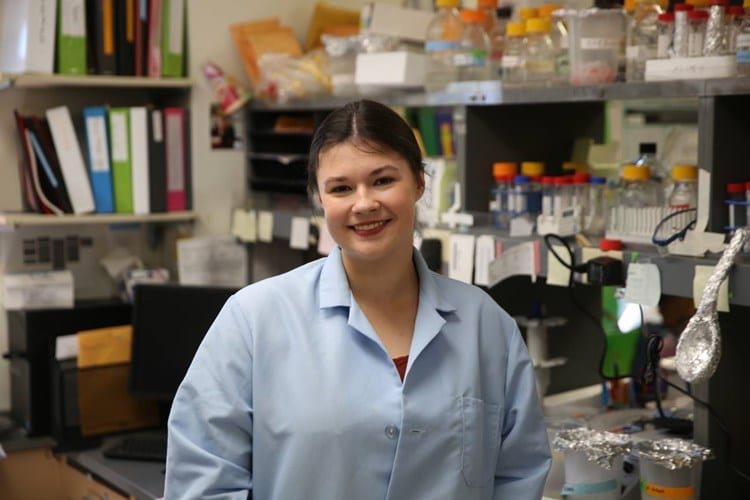
When Kristen Barwick made the decision to attend the University of Missouri, her primary goal was to get into a research laboratory. Barwick enjoyed biology and chemistry as a high school student and developed an interest in research after listening to a professor describe their research endeavors.
“I honestly didn’t even know research was an option until my senior year of high school,” Barwick said. “I was at a career fair and a scientist shared what they were working on. I immediately knew it was something I wanted to pursue. I’m big on asking questions and I love learning. Research gives me the opportunity to do both.
“I chose Mizzou because of its status as a Tier 1 research university. I knew I would be able to gain great insights and experiences here since there is such a strong focus on research.”
The Freshman Research in Plants (FRIPS) Program allowed Barwick, a biochemistry major, to get a taste of research during her first year as a Tiger when she joined the lab of Antje Heese, an associate professor of biochemistry. Barwick is still part of Heese’s lab as she enters her junior year.
“Dr. Heese is amazing,” Barwick said. “She’s helped me so much and prepared me to take on my own projects. I’m very blessed to be able to work with her.”

Barwick added that Heese played a big role in helping Barwick secure two national awards this summer. Barwick earned a 2022 American Society of Plant Biologists (ASPB) Summer Undergraduate Research Fellowship (SURF), a highly competitive national fellowship that helps undergraduate students conduct research in plant biology. Barwick also received a National Science Foundation (NSF) travel grant from the 2022 Plant Cell Biology International Conference, which was held this month in Greece.
“I knew both were a possibility, but I never dreamed I would be in this position,” Barwick said. “I love working in Dr. Heese’s lab, and the fellowship will allow me to not only continue to do so, but also build my own research footprint. Being able to travel to Greece was an amazing experience as well.”
Only a few undergraduate students receive the ASPB Fellowship each year. The fellowship includes a $4,000 summer stipend and membership into the ASPB. Barwick will also have the opportunity to travel to the ASPB annual meeting next year where she will present on her research, which is focused on working with bacteria to create a specific antibody to help locate proteins that can be used in further research. Her project is titled, “Expressing and purifying the Arabidopsis EPSIN 1 ENTH domain for antibody production.” Barwick works closely with Kelly Mason, a graduate student studying biochemistry.
“We work with plant immunity and spend a lot of time studying mutants that could potentially affect a plant’s ability to protect itself against pathogenic infections,” Barwick said. “It is really exciting work, and I’m happy to be a part of it.”
Barwick recently discussed her research during the 2022 Plant Cell Biology International Conference as well, which was held Aug. 1-5, in Crete, Greece. She received NSF funding for that trip, as well as funding from the MU Douglas D. Randall Young Scientists Development Fund and the MU Interdisciplinary Plant Group (IPG). The IPG is one of CAFNR’s Programs of Distinction.
“Kristen’s success underlines the critical nature of undergraduate research experiences and fellowships at MU that are so critical for our students to be competitive for fellowships at the national level,” Heese said.
Barwick, who is part of the Honors College at MU, said she is excited to continue to conduct research at Mizzou, especially in Heese’s lab. She is already starting to look at potential graduate school opportunities, too.
“Biochemistry offers you a lot of options and really unique pathways,” Barwick said. “For me, I’m interested in continuing my education as a graduate student and then doing research in industry. I would love to do research for a company.”
Written by: Logan Jackson, University of Missouri, College of Agriculture, Food, and Natural Resources; used with permission.
Please visit here to read the original article.
Founded in 1978, the Council on Undergraduate Research (CUR) focuses on providing high-quality and collaborative undergraduate research, scholarly, and creative activity. Among the many activities and networking opportunities that CUR provides, the organization also offers support for the professional growth of faculty and administrators through expert-designed institutes, conferences, and a wide-range of volunteer positions. The CUR community, made up of nearly 700 institutions and 13,000 individuals, continues to provide a platform for discussion and other resources related to mentoring, connecting, and creating relationships centered around undergraduate research. CUR’s advocacy efforts are also a large portion of its work as they strive to strengthen support for undergraduate research. Its continued growth in connections with representatives, private foundations, government agencies, and campuses world-wide provides value to its members and gives voice to undergraduate research. CUR is committed to inclusivity and diversity in all of its activities and our community.
CUR focuses on giving a voice to undergraduate research with learning through doing. It provides connections to a multitude of campuses and government agencies, all while promoting networking and professional growth to its community.


